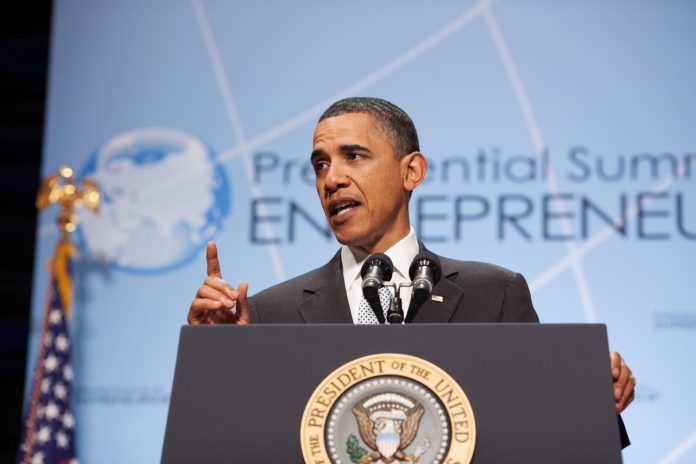President Obama has high hopes for the sixth annual Global Entrepreneurship Summit (GES), set for July 25-26 in Nairobi, Kenya.
“If enough folks respond to the challenge that I’m issuing today, I believe that at the summit in Nairobi we’ll be able to announce new investments and commitments that will pay off for years to come,” the president told emerging entrepreneurs from the United States and around the world in May at the White House. (Read an edited except of his remarks here). He had brought these entrepreneurs together to highlight the importance of investing in women and young entrepreneurs to create innovative solutions to some of the world’s toughest challenges — poverty, climate change, extremism, and access to education and healthcare — thereby setting the tone of the 2015 GES discussions.
In his remarks in May he also challenged governments, companies, entrepreneurial foundations and organizations, as well as individuals, to make their own commitments to the expansion of entrepreneurship, whether through training and mentorship programs, helping entrepreneurs access capital and connect to markets, or improving educational opportunities and exchanges. These are the challenges he hopes will bear fruit in Nairobi this month.
In one fruitful outcome of the 2014 GES in Morocco, for example, the United States and Swedish car-and-truck-maker Volvo Group agreed to jointly establish an academy for entrepreneurs in Morocco that will train 150 students each year from Morocco, Côte d’Ivoire, and Senegal, focusing on maintenance of industrial and commercial equipment. Training will also include technology and general business skills to prepare graduates for employment by local or multinational companies like Volvo, or as entrepreneurs.
President Obama has made entrepreneurship a priority of his administration and has hinted that it will remain as much in his post-White House life. “America is going to keep supporting entrepreneurs like you,” he said in May. “As long as I’m president, this is going to be a critical part of our engagement and our diplomacy with countries and peoples around the world, and I suspect I’ll still be working on it well after I’m President as well.”
Less than a year into the first term of his presidency, he laid the foundation for a global dialogue on entrepreneurship during a speech in Cairo, Egypt, announcing at the time that the United States would host a summit on entrepreneurship to identify how best to deepen ties between business leaders, foundations, and entrepreneurs in the United States and Muslim communities around the world. The first Global Entrepreneurship Summit took place in Washington, D.C., in 2010 and has since become an annual event, hosted consecutively by Turkey, Dubai, Malaysia, Morocco, and now Kenya. Typically, the topics covered at these summits are access to capital, venture capital 101, business models, and career advice.
The Obama Administration to date has committed roughly $3.2 billion to support micro, small, and medium-sized enterprises and mobilized $80 million in private capital for startup accelerators in the developing world through development financing institutions and programs. Here’s a summary of those programs.
· Young Leaders of the Americas, Young African Leaders, Young South East Asian Leaders initiatives. These provide annual fellowships, travel exchanges, networking, mentorship and investment opportunities so that participants can develop joint business and civil society initiatives.
· African Women’s Entrepreneurship Program (AWEP). Targets African women entrepreneurs to promote business growth, increase trade regionally and with U.S. markets through the African Growth and Opportunity Act (AGOA), create better business environments, and empower African women entrepreneurs to become voices of change in their communities.
· Women Entrepreneurship in the Americas (WEAmericas). Uses public-private partnerships to increase women’s economic participation in Latin America and the Caribbean by reducing common barriers to starting and growing SMEs: access to training and networks, access to markets, and access to finance.
· White House Demo Day. Set for launch on August 4, 2015, this event is focused on inclusive entrepreneurship, with a view toward ensuring that those underrepresented in entrepreneurship across the United States are being tapped to fully contribute their talents. Participants will “demo” success stories, highlighting the individual journeys of a diverse set of entrepreneurs.
· Global Innovation through Science and Technology Network (GIST Net). Launched at the fifth GES in Morocco, this user-driven platform provides science and technology entrepreneurs with online resources and mentorship to collaborate, seek funding, and grow their businesses.
· Spark Global Initiative. This program brings together the U.S. government’s main entrepreneurship programs, the United States will spark $1 billion in new private investments over the next three years for entrepreneurs worldwide, including social entrepreneurs. Half of these investments are expected to be generated by women and young entrepreneurs. Following the launch of the initiative in November 2014, some of the world’s foremost entrepreneurship organizations, led by Global Entrepreneurship Network, Entrepreneurs’ Organization and the Tony Elumelu Foundation, formed the Spark Global Entrepreneurship Coalition to connect, coordinate, and create common goals across public, private, and non-profit sector efforts to advance entrepreneurship around the world.
· Presidential Ambassadors for Global Entrepreneurship (PAGE). With a focus on technology, GES 2014 gave participants the opportunity to discover some of the latest trends and tools driving the next wave of innovators. For the first time, the Summit had a day dedicated to the specific challenges and opportunities relevant to women entrepreneurs, as well as a day-long program for young entrepreneurs.













